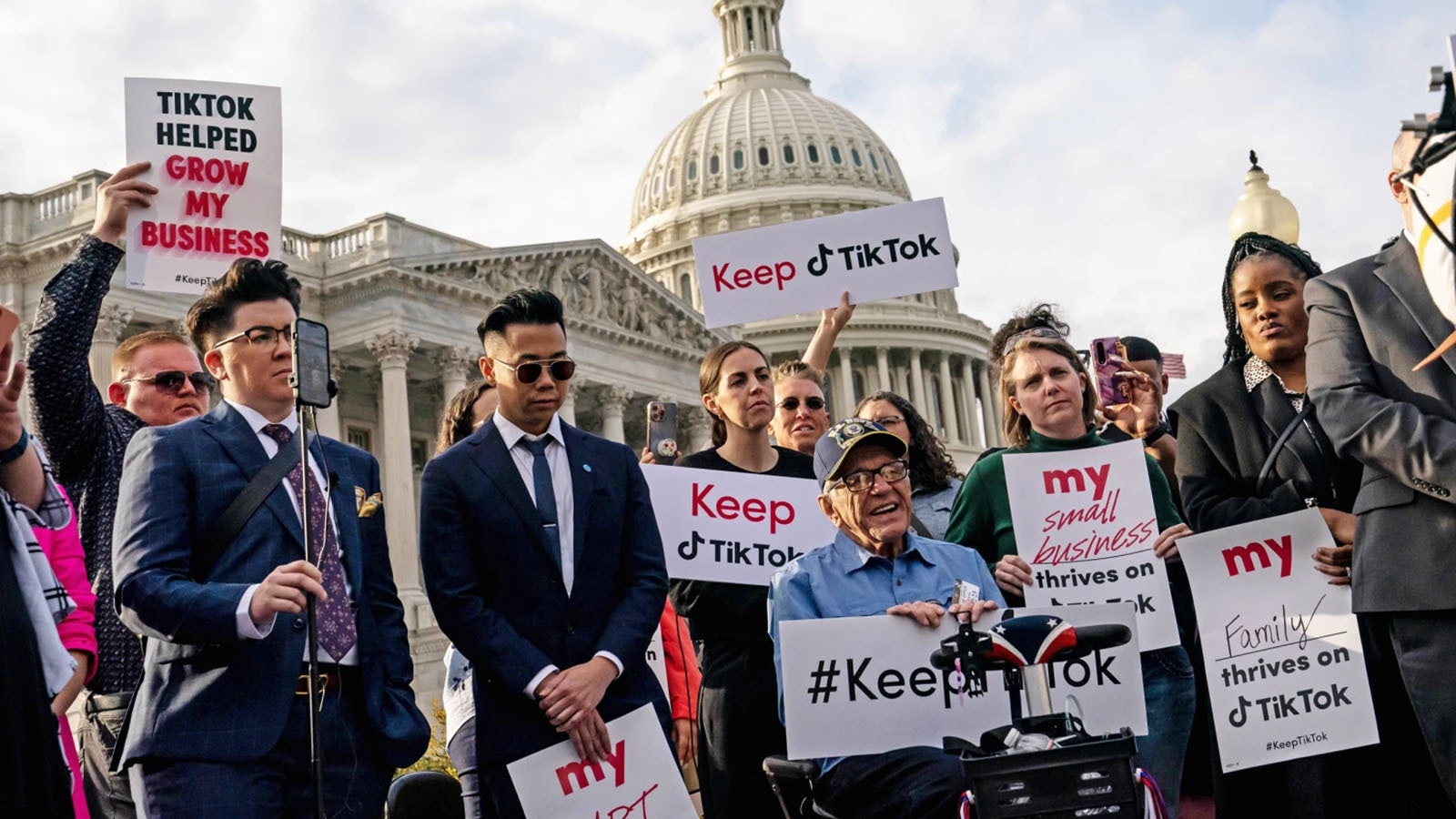While a provision that could ban the social media platform TikTok in the United States passed into law Wednesday, some Wyoming state lawmakers are still leery of it.
The provision will give TikTok’s Beijing-based parent company 270 days to sell the platform. Failing that, the ban would block the popular social media app in the United States.
President Joe Biden signed the ultimatum Wednesday.
Rep. Mike Yin, D-Jackson, who serves on the Wyoming Legislature’s Select Committee on Blockchain, Financial Technology and Digital Innovation, told Cowboy State Daily he believes Congress is overlooking the potential threats from other platforms, not just TikTok’s Chinese ownership.
“We need to take a broader look at all social media,” said Yin. “Simply picking one company, I think, does what former President Trump said it would do — help Mr. Mark Zuckerberg.”
Yin declined to elaborate.
Trump railed against the ban this week, claiming Biden is helping Facebook founder Zuckerberg’s Meta platforms to profit and gain political influence.
Trump and Yin are not alone in this theory. The Washington Post concluded the same in a Wednesday analysis, while Business Insider pointed to Meta-owned Instagram’s Reels, as well as Alphabet-owned YouTube’s Shorts as competitors who stand to benefit.
Facebook’s actions factor into the massive evidence pool in Missouri v. Biden, in which a handful of plaintiffs are accusing the federal government of using social media to further a censorship conspiracy and influence the 2020 election.
No Less Addictive
Rep. Daniel Singh, R-Cheyenne, told Cowboy State Daily he understands the arguments against U.S. TikTok use, but he fears the ultimatum hinders freedom of speech, and he does not expect the provision to survive a court challenge.
“That is troubling to me,” said Singh when the president signed the provision, adding he would be “hesitant to restrict what Americans have access to.”
Singh is also a member of the tech committee.
While Congress, including Wyoming’s three federal delegates, has advanced the TikTok ban largely to keep Americans’ data out of the hands of the Chinese Communist Party, some politicians have floated concerns about TikTok’s harmful mental health impacts on American youth.
The app feeds short videos rapidly into a viewer’s phone or device.
“Just because TikTok was an innovator in social media doesn’t mean American social media platforms aren’t any less addictive or damaging to the developing mind,” Singh said. “So, we’ve got to be cautious of that.”
Actually, National Security
Committee Co-Chair Rep. Cyrus Western, R-Big Horn, agreed with the ultimatum and said it’s about kicking Chinese political influence out of the United States.
The Chinese company behind TikTok has “direct access to tens of millions of teenagers in America,” said Western. “They can mold their thoughts or opinions. There’s no question they’re wielding that power.”
Western said TikTok has a reprehensible impact on minors’ mental health.
He countered First Amendment arguments against the ultimatum, saying there are still plenty of social media platforms on which Americans can express themselves.
“The First Amendment is alive and well,” said Western.
Sen. Dan Furphy, R-Laramie, agreed with Western and pointed to the amount of time state lawmakers spent this winter on a failed effort to block foreign ownership of Wyoming farmlands.
Data Harvest
Wyoming’s lone U.S. House representative and two U.S. senators have matched up with Western’s perspective in the past.
“With user data on millions of Americans and over 210 million downloads in the United States, TikTok is a clear and present danger to our national security,” Rep. Harriet Hageman, R-Wyoming, said in a March press release. “Due to the structure of laws governing business under the Chinese Communist Party (CCP), this user data is not only available to parent company ByteDance, but also to the Chinese government.”
Sens. John Barrasso and Cynthia Lummis, both Wyoming Republicans, voiced similar statements at the time, with Lummis saying the company should cut ties with the CCP, and Barrasso saying the CCP has been using TikTok to spy on Americans.
Know What You’re About
Committee Co-Chair Sen. Chris Rothfuss, D-Laramie, said he favors the ultimatum more than he would an outright ban, but he hopes people in Congress have decent data to back their actions.
He added that state legislators typically don’t have access to the same level of intelligence as people working at the federal level, so it’s hard to make judgment calls from here.
“We can grandstand as state legislators and as governors and as people that don’t actually have access to the intelligence that underlies those allegations. But it’s just that. It’s just grandstanding,” he said. “I would certainly not cast a vote really either way on this, based on the information I have; I am just hopeful that this legislation is based on sound intelligence.”
Clair McFarland can be reached at clair@cowboystatedaily.com.





